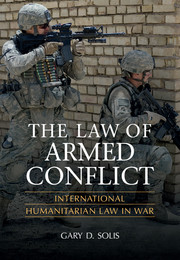Book contents
- Frontmatter
- Contents
- Table of Cases
- Table of Treaties
- Foreword
- Preface
- Acknowledgments
- LAW OF ARMED CONFLICT: INTERNATIONAL HUMANITARIAN LAW IN WAR
- LAW OF ARMED CONFLICT AND INTERNATIONAL HUMANITARIAN LAW: A FRAMEWORK
- LAW OF ARMED CONFLICT AND INTERNATIONAL HUMANITARIAN LAW: BATTLEFIELD ISSUES
- 9 Obedience to Orders, the First Defense
- 10 Command Responsibility and Respondeat Superior
- 11 Ruses and Perfidy
- 12 Torture
- 13 Rules of Engagement
- 14 Targeting
- 15 Attacks on Cultural Property
- 16 The 1980 Certain Conventional Weapons Convention
- 17 Gas, Biological, and Chemical Weapons Treaties
- References
- Index
- References
10 - Command Responsibility and Respondeat Superior
from LAW OF ARMED CONFLICT AND INTERNATIONAL HUMANITARIAN LAW: BATTLEFIELD ISSUES
- Frontmatter
- Contents
- Table of Cases
- Table of Treaties
- Foreword
- Preface
- Acknowledgments
- LAW OF ARMED CONFLICT: INTERNATIONAL HUMANITARIAN LAW IN WAR
- LAW OF ARMED CONFLICT AND INTERNATIONAL HUMANITARIAN LAW: A FRAMEWORK
- LAW OF ARMED CONFLICT AND INTERNATIONAL HUMANITARIAN LAW: BATTLEFIELD ISSUES
- 9 Obedience to Orders, the First Defense
- 10 Command Responsibility and Respondeat Superior
- 11 Ruses and Perfidy
- 12 Torture
- 13 Rules of Engagement
- 14 Targeting
- 15 Attacks on Cultural Property
- 16 The 1980 Certain Conventional Weapons Convention
- 17 Gas, Biological, and Chemical Weapons Treaties
- References
- Index
- References
Summary
Introduction
Command responsibility, also referred to as “superior responsibility,” is the other side of the obedience-to-orders coin. The soldier who obeys a manifestly unlawful order is culpable for any violation of the law of armed conflict (LOAC) resulting. The superior who gave the unlawful order is equally culpable for the subordinate's violation by reason of having given the unlawful order. In the past, it was viewed as a form of the crime of aiding and abetting. No longer. Today, most authorities accept that “[command responsibility] does not mean…that the superior shares the same responsibility as the subordinate who commits the crime…but that the superior bears responsibility for his own omission in failing to act.” The superior is not responsible as an aider and abettor, but is responsible for his neglect of duty in regard to crimes that he knew were committed by his subordinates. “The superior's criminal responsibility flows from the neglect of a specific duty to take the measures that are necessary and reasonable in the given circumstances.”
Respondeat superior, “let the master answer,” is a broader legal concept than command responsibility. In case law and in most LOAC/international humanitarian law (IHL) texts there is no distinction between command responsibility and respondeat superior and the distinction is thematic rather than doctrinal. Command responsibility, as the term suggests, indicates the criminal liability a commander bears for illegal orders that he or she issues.
- Type
- Chapter
- Information
- The Law of Armed ConflictInternational Humanitarian Law in War, pp. 381 - 419Publisher: Cambridge University PressPrint publication year: 2010



